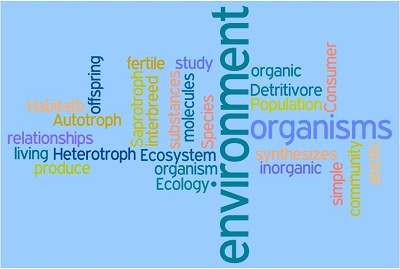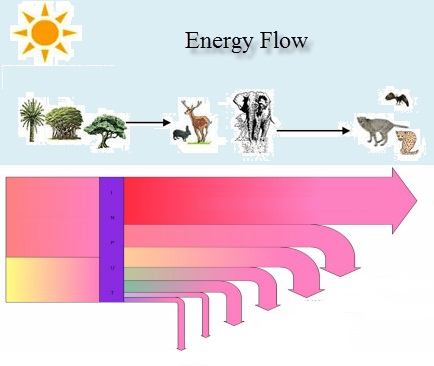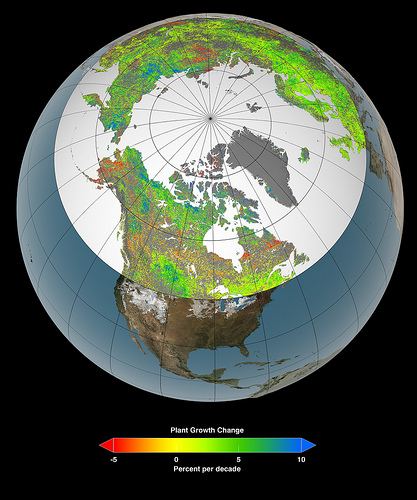Ecology Activities for Learning
Lesson Plans for the Ecology Topic
These learning activities cover everything in the IB guide for this topic. Lesson plans include resources to use on an interactive white board and worksheets to print. There is a mix of laboratory work, theory lessons, and assessment materials with model answers.
Species & communities - Planning sheet 4.1This simple sheet sets out the learning objectives, essential questions and some ideas for assessment for the following activities | |
 | Ecological termsTime: 1hr According to the BES, "Ecology is the study of the distribution and abundance of organisms, the interaction between organisms, the interaction between organisms and their environment, and structure and function of ecosystems." Using key concepts and important ecological terms students work to connect these ecological ideas and to make links between them to enhance their knowledge and understanding. |
 | Food WebsTime: 1hr A simple introductory food web activity to review trophic levels and feeding relationships students begins this level and then students complete a card sorting activity to consolidate terms such as heterotroph, carnivore, secondary consumer. These cards are finally used to construct a food web. A super online food webs activity serves as an extension task or an alternative way to illustrate the nature of feeding relationships. |
 | Mesocosm LabTime: 1hr Mesocosm experiments have become a valuable tool to circumvent the shortcomings of correlation studies in ecological research. There is plenty of scope for using this apparently simple middle school science club project idea as a great learning activity in IB Biology. In this lesson students build a mesocosm and use it in a long term investigation. |
Ecology mini-investigationTime: 1hr This is an opportunity to introduce the structure of an investigation to the students to illustrate random sampling, using quadrat frames, data analysis and testing for an association between two species using the chi-squared test. | |
 | Ecology field trip - at homeTime: 1 - 2 hr One component of the IB Biology course which students complete individually is the IA. So it is potentially a good source of activities to do while students are learning from home during the Covid-19 pandemic. Practical work is difficult to organise for students at a distance but this activity uses simple tools which can be made at home. A small patch of grass in the garden or in a local public space is likely to be accessible to most students, even if they are only allowed out for a short period of exercise once a day. |
Energy flow - Planning sheet 4.2This simple sheet sets out the learning objectives, essential questions and some ideas for assessment for the following activities | |
 | Energy Flow in Food ChainsTime: 1h The concept of energy flow in food webs is key to understanding them in a way which is useful to ecologists. A range of activities linked with some IB style questions lead students to a clearer understanding of food chain and food web energetics. |
Carbon cycling - planning sheet 4.3This simple sheet sets out the learning objectives, essential questions and some ideas for assessment for the following activities | |
Carbon Cycle Skills.Time: 1h The size and speed of carbon flux between different carbon reservoirs and the processes responsible give a detailed understanding of the carbon cycle. This lesson begins with the identification of different carbon molecules, then the reservoirs and the processes which make up the carbon cycle. Analysis of data from the latest research is where todays controversies lie and students are given opportunities to test their understanding in this sort of data analysis in the third activity. | |
Climate change - planning sheet 4.4This simple sheet sets out the learning objectives, essential questions and some ideas for assessment for the following activities | |
 | Enhanced Greenhouse EffectTime: 1h Students review the greenhouse effect and the greenhouse gases. The important point in this lesson is that human activity is enhancing the greenhouse effect and this is causing climate change. This point is illustrated by a simple experiment which illustrates the main points well. |
Climate Change.Time: 1- 2hrs Two short videos introduce this lesson. David Suzuki gives a simple outline of the process of climate change due to an enhanced greenhouse effect and the second illustrates the complexity of the models which attempt to predict the consequences. The second activity asks students to evaluate a series of scientific claims about climate change using a format based on the scientific method. (ToK link) Having studied these simple starters students are then asked to apply their new skills of evaluation to the consequences of climate change on Arctic ecosystems (or Coral reefs in the 2014+ guide)file |

